For nearly 20 years now, besides the traditional teaching model with the familiar image of "blackboard and chalk", a new university system has sprouted and is growing - the digital university system.
During a recent working session at Ho Chi Minh City National University and Hanoi National University, Minister of Information and Communications Nguyen Manh Hung said that we need many applied-level digital technology engineers to accelerate national digital transformation, industrialization and modernization of the country.
The demand for human resources in information technology and digital technology in Vietnam is 150,000 engineers/year. Currently, only 40-50% is met. The demand for human resources in the semiconductor industry is 5-10,000 engineers/year. Currently, only less than 20% is met.
Minister Hung emphasized that digital universities are the solution to the huge demand for digital human resources today. So how are “digital universities” developing in Vietnam?
BILLION-DOLLAR UNIVERSITY TRAINING MARKET, HELPING VIETNAMESE STUDENTS ACCESS MANY GLOBAL COURSES
At Ho Chi Minh City University of Technical Education , Dr. Quach Thanh Hai, Head of Training Department, recognized that digital education and the digital university model are a trend of the times that all countries with leading education systems in the world are implementing and are very effective.
Mr. Hai cited that the revenue from digital education in the world in 2023 is about 103.8 billion USD, of which the largest proportion is digital higher education with 103.8 billion USD (62.5%), according to information from the World Bank. In addition, digital training helps save up to 50% of costs/student/credit. Therefore, according to Mr. Hai, Vietnam's higher education needs a strategy to develop a digital university model to participate deeply in the world's trends, integrate and catch up with the educational development of the times.
At Ho Chi Minh City University of Technical Education, according to Mr. Hai, over the past 10 years, the school has conducted many studies and experiments on digital university models and gradually implemented them in practice, learned from experience and made adjustments according to the trends of the times.
“Since 2014, we have deployed digital teaching with LMS (Learning Management System) systems, creating opportunities for the teaching staff to deploy more diverse advanced teaching models, activating learners such as: Project-based-learning, work-based-learning by doing, blended learning... In addition, the school has also implemented solutions to digitize documents and manage operations,” said Mr. Hai.
The Head of Training Department, Ho Chi Minh City University of Technical Education said that these things contribute significantly to improving the quality of training and have been demonstrated by the evaluation from learners, lecturers and the business community using the school's engineers/bachelors.
On the other hand, according to Mr. Hai, by 2018, the school will continue to diversify and digitize management and assessment systems. Regarding training, the school will continue to deploy online learning by choosing to develop Massive Open Online Courses (MOOCs) on the UTEx online learning system platform, researched and built by the school.
This system allows students to enroll in these modules along with MOOCs on other popular online learning platforms, which are typically designed with self-study time accounting for 70%-100% of the module's duration.
This gives learners the opportunity to access more quality courses from other universities around the world. These are also the above solutions that help the school to still operate and organize training completely online during the social distancing period due to the recent Covid-19 pandemic.
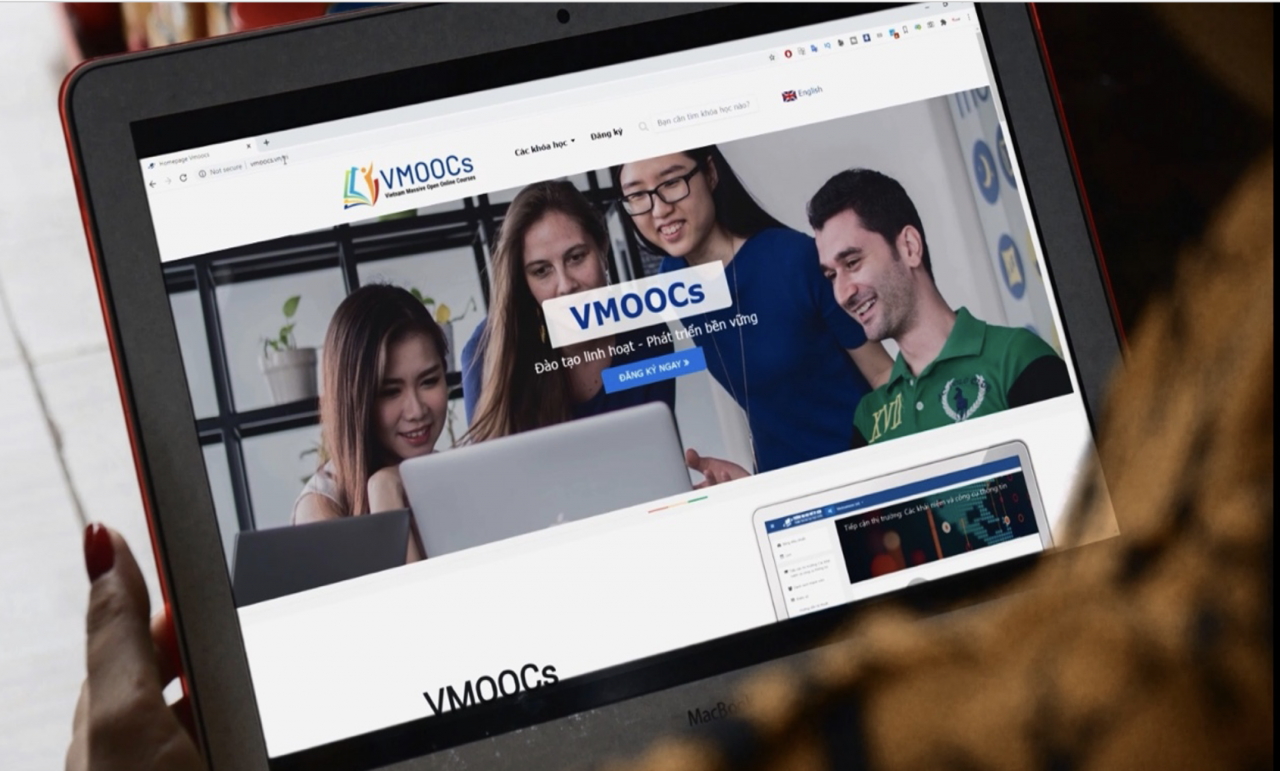
The VMOOCs system was built by Ho Chi Minh City Open University, providing free massive open online courses in Vietnam.
“Number” sprouted very early at Ho Chi Minh City Open University – a university that focuses on online and distance learning in Vietnam. Professor Nguyen Minh Ha, Principal of Ho Chi Minh City Open University, recalls that on June 22, 2006, when the public university was renamed Ho Chi Minh City Open University, it was also the time when the school started to organize credit-based training and learners were proactively registered for online courses on the internet.
At this time, classroom management, class schedules, timetables and other general information of students have also been updated into the common data system, helping to stabilize learning and teaching management.
By 2016, the online bachelor training programs at the school were officially launched after a long preparation process, along with the school establishing the Online Training Center. These online training programs have contributed significantly to training quality human resources for society and also marked the digital transformation in the school's training.
The modern online learning system – LMS 3.5, along with the training program designed by the school according to the international quality standards of the Quality Matters organization – USA, has been helping learners pursue their learning aspirations anytime, anywhere”- Professor Ha said.
To date, 100% of courses use LMS in the school's teaching and learning process. Three years later, the school began piloting a blended learning model for full-time university students.
“This is because we responded promptly during the Covid-19 pandemic, still ensuring that learning and teaching were not interrupted. Lecturers can switch to online teaching and learning via LMS and video conference software for groups of classes with the consent of learners” - Prof. Dr. Nguyen Minh Ha emphasized.
By 2020, Ho Chi Minh City Open University continued to research and apply science and technology to build the VMOOCs (Vietnam Massive Open Online Courses) system, providing free Vietnamese Massive Open Online Courses.
“This is also a “digital platform”, responding to the goal of the project “Developing a digitalized Vietnamese knowledge system”, implemented by the Government since 2018” - Mr. Ha affirmed.
THE "HEART" OF DIGITAL UNIVERSITY IS DIGITAL TRAINING AND DIGITAL MANAGEMENT
Dr. To Van Phuong, Head of Training Department, Nha Trang University, said that the two key areas for the school's digital transformation are digital training and digital management. In which, digital training is to convert training activities from face-to-face in the classroom to the digital environment.
Up to now, the school is implementing 2 levels of blended training (blended-learning, online classes supporting classrooms) with the method of providing textbooks and documents; forums for students to discuss and answer questions outside of class hours; tests, and submit assignments online.
Distance learning (e-learning, completely online classes), that is, in addition to similar content to blended training, using video conference software for lecturers to teach online and organize exams, evaluate online class results.
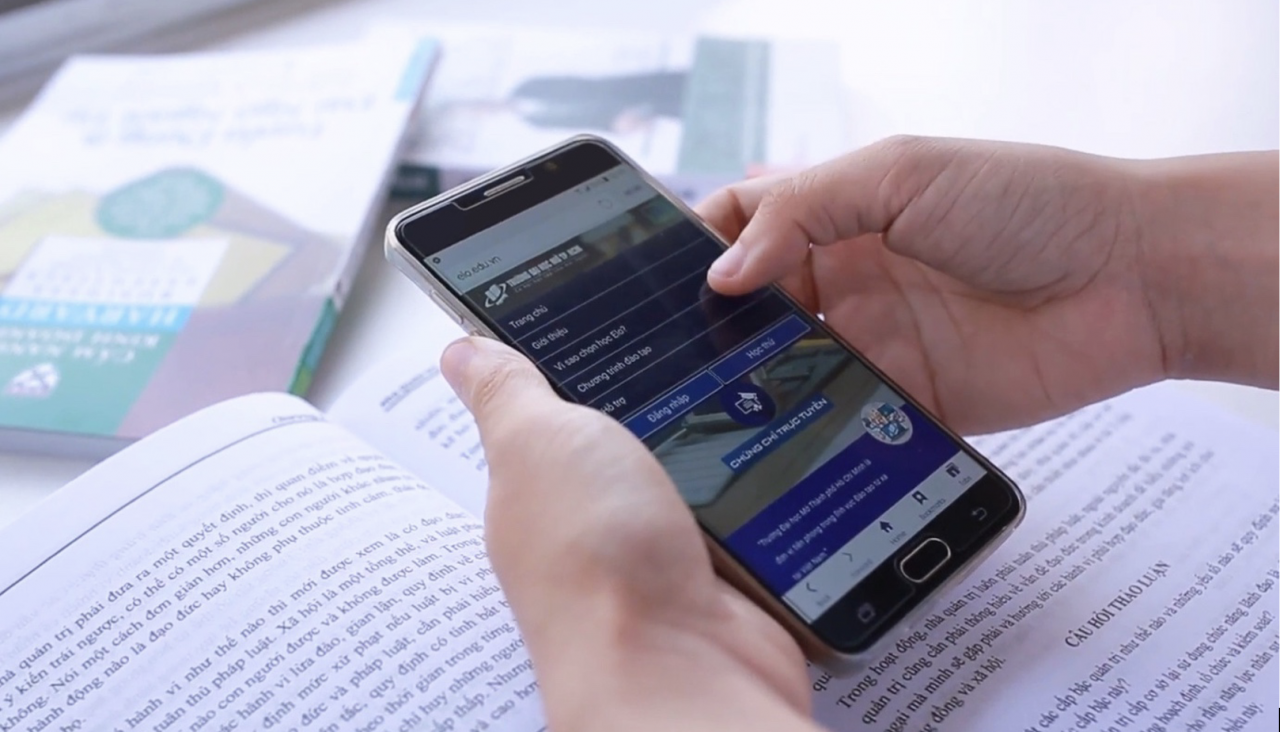
Through the smartphone application, online learners can study anytime, anywhere, conveniently listening to lectures over and over again.
“With this method, we focus on developing digital learning materials so that students can access remote learning, especially online simulation exercises, and build a digital library,” said Mr. Phuong.
In the field of digital administration, Mr. Phuong informed that administrative activities related to students and civil servants have been carried out in the digital environment, such as candidates submitting application forms for admission and completing admission procedures online.
Students register for courses, check grades, pay tuition online, and perform academic procedures online on the one-stop software. On the other hand, the school is equipped with an electronic office system, performing administrative activities related to staff online.
Vietnam Aviation Academy has also gradually built a digital university. Assoc. Prof. Dr. Tran Hoai An, Chairman of the School Council, said that to build a digital university, it is necessary to do two things: one is to build digital management and administration tools, and two is to build digital data on learning materials, including lesson plans, lectures, textbooks, reference materials. Vietnam Aviation Academy uses digital management and administration tools on the Base digital transformation platform.
The heart of digital governance is a system of legal and internal regulations and rules; standardized processes (ISO) are digitized and incorporated into digital transformation software.
According to Associate Professor Tran Thien Phuc, Principal of Ho Chi Minh City University of Technology , since 2007, the school has applied digitalization with the BK E-Learning science resource warehouse. Initially, this science resource warehouse only stored lectures and teaching materials such as books, newspapers, and reference materials to create a place for teachers and students to study outside of class hours.
By 2012, the school implemented all subjects using an E-Learning site, creating a virtual classroom online. The school conducted tests, assessments, exams, and assignments. By 2018, the school upgraded the E-Learning system, students can study in groups and participate in activities on this system.
During the Covid-19 outbreak, Ho Chi Minh City University of Technology continued to promote virtual classes when all students could not go to school. At this time, 22 studios were lecture halls, teaching on this system.
“So everything in the real classroom is transferred to the virtual classroom, only the tests and practical experiments cannot be digitized. Currently, Ho Chi Minh City University of Technology is moving towards virtual labs, students can do experiments anywhere as long as there is a computer with a real-life experience” - Associate Professor Phuc said.
According to Mr. Hoang Minh Son, Deputy Minister of Education and Training, the Ministry will take the lead in implementing and coordinating with other ministries and schools to build a shared open online course platform VN-MOOC, support training facilities with infrastructure to carry out digital transformation; design and deploy the construction of digital learning materials and online courses; develop a blended learning model and ensure the quality of online training.
Ho Chi Minh City National University will preside over and coordinate with Hanoi National University, Hanoi University of Science and Technology, Danang University of Science and Technology, and the Academy of Posts and Telecommunications Technology to develop a project on digital human resource training.
Hanoi University of Science and Technology is in charge of developing a pilot project to deploy a digital university education model, and to develop training program standards for the computer and information technology sectors. The pilot project to deploy a digital university education model sets a goal of building 100 online courses with an expected number of students participating in learning on the shared MOOCs system of about 10,000 students.
Vietnamnet.vn






![[Photo] General Secretary To Lam presents the First Class Labor Medal to the Vietnam National Energy and Industry Group](https://vphoto.vietnam.vn/thumb/1200x675/vietnam/resource/IMAGE/2025/9/21/0ad2d50e1c274a55a3736500c5f262e5)





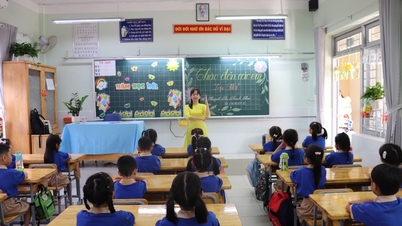















![[Photo] General Secretary To Lam attends the 50th anniversary of the founding of the Vietnam National Industry and Energy Group](https://vphoto.vietnam.vn/thumb/1200x675/vietnam/resource/IMAGE/2025/9/21/bb0920727d8f437887016d196b350dbf)


























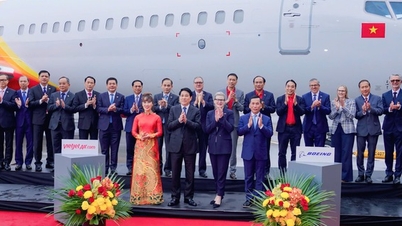

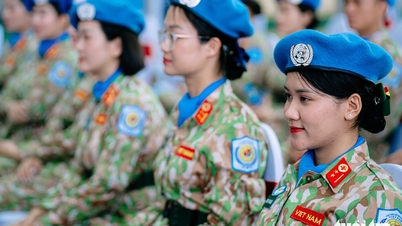





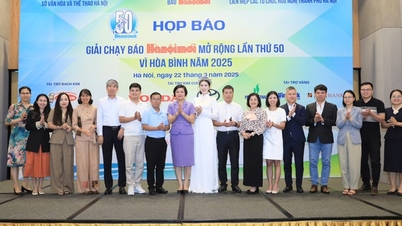
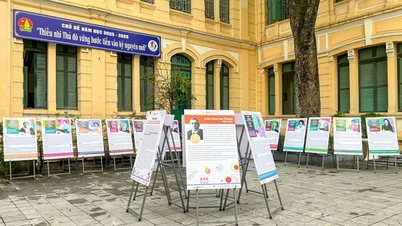



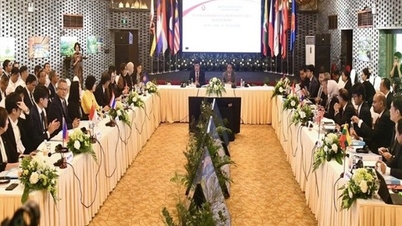








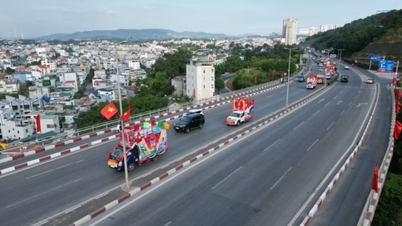














Comment (0)